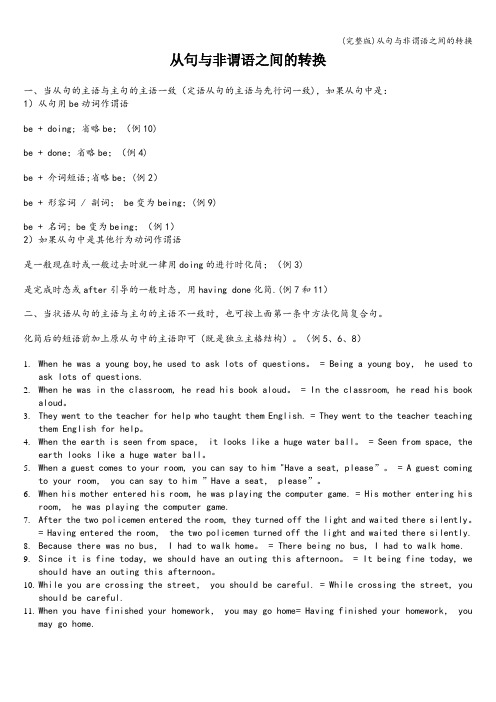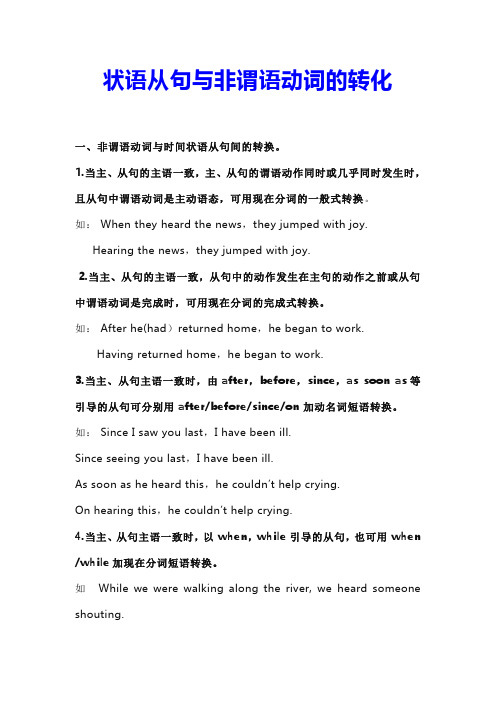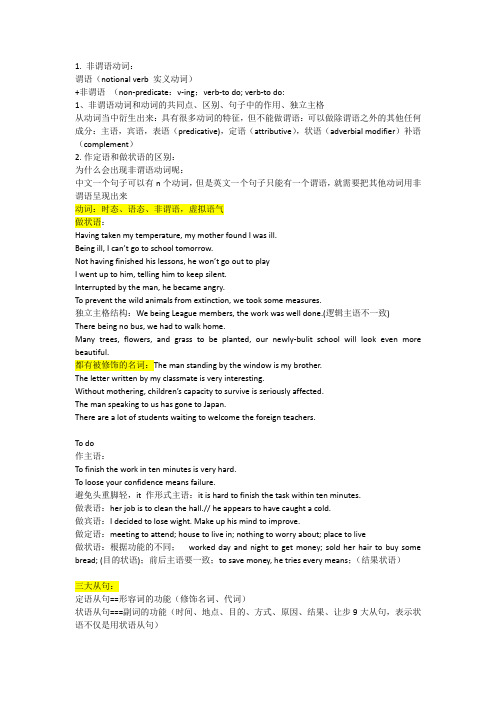(完整版)非谓语动词和从句的转换
(完整版)从句与非谓语之间的转换

从句与非谓语之间的转换一、当从句的主语与主句的主语一致(定语从句的主语与先行词一致),如果从句中是:1)从句用be动词作谓语be + doing; 省略be;(例10)be + done;省略be;(例4)be + 介词短语;省略be;(例2)be + 形容词 / 副词; be变为being;(例9)be + 名词; be变为being;(例1)2)如果从句中是其他行为动词作谓语是一般现在时或一般过去时就一律用doing的进行时化简;(例3)是完成时态或after引导的一般时态,用having done化简.(例7和11)二、当状语从句的主语与主句的主语不一致时,也可按上面第一条中方法化简复合句。
化简后的短语前加上原从句中的主语即可(既是独立主格结构)。
(例5、6、8)1.When he was a young boy,he used to ask lots of questions。
= Being a young boy, he used toask lots of questions.2.When he was in the classroom, he read his book aloud。
= In the classroom, he read his bookaloud。
3.They went to the teacher for help who taught them English. = They went to the teacher teachingthem English for help。
4.When the earth is seen from space, it looks like a huge water ball。
= Seen from space, theearth looks like a huge water ball。
5.When a guest comes to your room, you can say to him "H ave a seat, please”。
(完整版)状语从句与非谓语作状语的转换

状语从句与非谓语作状语的转换将下列非谓语作状语改成状语从句不定式1. 作__________状语:He went to Shanghai to visit his parents.To save the earth,we must prevent the earth from being polluted。
I shut the door quietly,so as not to wake the baby.2。
作____________________-状语:He is too naughty to please his teachers。
He is old enough to go to school。
We came home after our holiday , only to find our garden neat and tidy.3。
作_________状语:不定式做_______状语时, 一般放在句子末尾。
She burst into laughter to see his funny action。
The boy was shocked to see the frightening scene分词1)作_______状语:Hearing the bad news, she burst into tears.Seen from the hill, the park looks more beautiful.Having found a seat, she left her books on it.(2) 作_______状语:Being so poor in those days, they couldn't send the boy to school。
Born in a poor family, the boy could not go to school。
(3) 作_______状语:Adopting this method, we will raise the average yield by 40 percent。
从句与非谓语动词之间的转换

从句与非谓语动词之间的转换非谓语动词和从句可以相互转换,那么如何将复合句改为简单句呢?首先,需要分清主从复合句,然后取消从句,一般要把引导从句的连词去掉。
例如,将"When he was waiting for the bus。
he saw a dog"改为"Waiting for the bus。
he saw a dog"。
其次,如果从句的谓语动词是主动式,就要把谓语动词改为现在分词;如果从句的谓语动词是被动式,就要把谓语动词改为过去分词,并且要注意时态的变化。
例如,将"After he had finished his homework。
he went home"改为"Having finished his homework。
he went home"。
另外,使用分词短语作状语时,它逻辑上的主语必须与句子的主语一致。
如果主从句的主语不一致,在取消掉从句变为-ing或-ed形式时,要把从句的主语保留,其它部分和以前的改法一样。
例如,将"As it was hot。
we went swimming"改为"It being hot。
we went swimming"。
需要注意的是,在使用分词短语作状语时,它也可以有自己独立的逻辑上的主语,这种结构称为独立主格结构。
在很多情况下,它都表示一种伴随的动作或表示一种原因。
例如:1.If the weather allows。
I will go there.2.After the rain ped。
XXX.3.His XXX。
and he prepared to return to his institute.4.With so many comrades absent。
XXX.From the above examples。
we can see that the present participle (-ing) usually indicates an n that is happening at the same time as the main verb in the sentence。
非谓语动词与从句的转化简化(课堂PPT)

5. v-ing形式作状语可换成相应状语从句
1)On arriving =as soon as I arrive
there ,I will telephone you(时间).
2)(while) waiting for the bus, I caught sight of her(时间).
疑问句 1.简单句 祈使句
句
感叹句
表语从句
子 的 2.并列句
主语从句
分
名词性 宾语从句
类
从句
同位语从句 <=>非谓
3.主从复合句 定语从句
语动词
状语从句
非谓语动词与从句间的相互关系及转换:英语中的 非谓语动词是整个英语语法当中非常重要的部分, 也是英语学习的一个难点。非谓语动词作句子成分 时与相应的从句有着千丝万缕的联系,它们之间可 以有条件的进行相互转换。
your advice. =that I haven’t accept 2)He suggests us making better
use of the school library. =that we (should) make better
3)He found the street lined
=that the street was lined
=while I was waiting
3)Educated by the Party, he became =As he was a great fighter(原因). educated
4) Not having =Because I hadn’t
received an answer, I wrote again.(原因).
非谓语动词与状语从句的转化

非谓语动词与状语从句的转化非谓语动词与状语从句的转化状语从句是同学们在初中就掌握的内容,现将非谓语动词与状语从句之间转换的规律作一归纳,帮助大家更好地掌握非谓语动词。
一、非谓语动词与时间状语从句间的转换。
1 .当主、从句的主语一致,主、从句的谓语动作同时或L乎同时发生时,且从句中谓语动词是主动语态,可用现在分词的一般式转换。
如:When they heard the news,they jumped with joy.Hearing the news,they jumped with joy.当他们听到这则消息时,高兴得跳了起来。
2 .当主、从句的主语一致,从句中的动作发生在主句的动作之前或从句中谓语动词是完成时,可用现在分词的完成式转换。
如:After he(had)returned home,he began to work.Having returned home,he began to work.回到家以后,他开始工作。
3 .当主、从句主语一致时,由after,before,since,as soon as等引导的从句可分别用after/before/since/on加动名词短语转换。
如:Since I saw you last,I have been ill.Since seeing you last,I have been ill.自从我上次见你后,就一直在生病。
As soon as he heard this,he couldn’t help crying.On hearing this,he couldn’t help crying.他一听到这事,不禁哭了起来。
4 .当主、从句主语一致时,以when,while引导的从句,也可用when /while加现在分词短语转换。
如While we were walking along the river, we heard someone shouting.While walking along the river,we heard someone shouting当我们正沿着河走时,我们听到有人喊叫。
非谓语动词和从句的转换课件

The man who / that is talking to my teacher is my father.
非谓语动词和从句的转换
19
5. v-ing形式作状语可换成相应状语从句
我一到那,就给你打电话 On arriving there, I will telephone you. As soon as I arrive there, I will telephone you.
8
A. 现在分词与过去分词作状语
1. 时间状语:可改为时间状语从句,也可在分词前加上 连词“when , while , until”等,使其时间意义更 明确。(多置于句首,也可置于句末)
2. 原因状语:可改为原因状语从句或并列结构。(多置于 句首或句末,也可置于句中)
3. 条件状语:可加连词if , unless 等;也可换成条件 状语从句。(多置于句首)
6
While waiting at the dentist’s, I read the whole of a short story. (=While I was waiting … ) Before being in the army, he was an engineer.
(= Before he was in the army, …) __H_av_in_g__fi_ni_sh_e_d__(finish) my work, I went to
(= As we were so poor …) Weighing almost one hundred jin, the stone was moved by him. (=Though the stone weighed almost one hundred jin, …)
高考语法复习之非谓语动词做定语及与定语从句的转换

非谓语动词作定语一:如何轻松精准的做此类题呢只需把握住两点:一先看非谓语动词与其逻辑主语(即定语的先行词)之间的关系,主动与被动二看非谓语动词与谓动的时间关系1与谓动同时发生2在谓动之前3在将来发生二:做题步骤:先搞清非谓语动词与先行词之间的逻辑关系1如果是主动关系,再看时间,与谓动同时发生用doing 将来发生用to do2如果是被动再看时间,与谓语动词同时发生用being done 在谓动之前用done表将来用to be done一.用不定式做定语的几种情况:(1)不定式表将来。
如:The car to be bought is for his sister.(2)用来修饰被序数词、最高级或no, all, any 等限定的中心词。
如:He is the best man to do the job.She was the first woman to win the gold medal in the Olympic Games.(3)用来修饰的词是抽象名词时用不定式,常见的有:ability, chance, idea, fact, excuse, promise, answer, reply, attempt, belief, way, reason, moment, time 等Do you have the ability to read and write in English?I have no chance to go sightseeing.二.分词作定语doing 主动进行being done 被动进行done 被动完成The houses being built are for the teachers.Things lost never come again.I have never seen a more moving movie.三、to be done , done, being done 做定语的区别三者的语态同为被动语态,区别主要集中在时态上Have you read the novel witten by Dickens?Listen! The song being sung is very popular with the students.The question to be discussed at tomorrow's meeting is a very important one.(一)、-ing形式作定语-ing 形式在句中做定语时有两种情况。
(完整版)定语从句和非谓语做定语的转换

定语从句和非谓语做定语的转换非谓语做定语是定语从句的简化形式Please replace the underlined part with relative clauses1.The picture hanging on the wall is painted by my nephew.2.The Olympic Games, held in 776 B。
C。
, did not include women players until 1912.3. The first text books written for teaching English as a foreign language came out in the 16thcentury。
4.Are you going to attend the meeting to be held tomorrow?5. a developed/developing country6. He is a student loved by all the teachers.7.The building being built will be the third Teaching Building of our school。
8.She is always the first (one) to come and the last to leave.9.Let's first find a room to live in / to put the things in.10.We have nothing to worry about。
11.I have a lot of things to do today。
12.Have you got anything to say at the meeting?总结:现在分词做定语从时态上表示_______ 或_________ 从语态上表示________;若表示被动; 可以用_______过去分词做定语从时态上表示_____或______ 从语态上表示____________不定式做定语从时态上表示__________ 从逻辑上可以表示动词和先行词之间的_______ 同时要注意加上相应的介词,若先行词被________________________所以修饰,定语从句部分可以用不定式替代Replace the underlined part with ing/ ed / to do1。
非谓语动词和从句的转换优秀课件

一、什么叫做非谓语动词
在英语中,动词按其在句子中的作用,可分为: 谓语动词和非谓语动词。 谓语动词就是可以单独直接在句子中做谓语的动词。 非谓语动词就是不能单独在句子中做谓语的动词。
二、非谓语动词的表现形式有:
不定式 (to do) 现在分词 (doing) 过去分词 (done) 动名词 (doing)
1. 时间状语:可改为时间状语从句,也可在分词前加上 连词“when , while , until”等,使其时间意义更 明确。(多置于句首,也可置于句末)
2. 原因状语:可改为原因状语从句或并列结构。(多置于 句首或句末,也可置于句中)
3. 条件状语:可加连词if , unless 等;也可换成条件 状语从句。(多置于句首)
If we weIrfegGgiivviveeennn more time , we could do it much better .
He was Wwarned of the danger, bhuet he still went skating on the ice.
但是,有些分词作状语是独立结构,不与句子的主语 产生联系;常见的有:judging from, generally
While waiting at the dentist’s, I read the whole of a short story. (=While I was waiting … ) Before being in the army, he was an engineer.
(= Before he was in the army, …) __H_av_in_g__fi_ni_sh_e_d__(finish) my work, I went to
高考语法复习之非谓语动词做状语及与状语从句的相互转化与语法填空的应用

非谓语动词作状语高考对非谓语动词作状语的考查多与对动词其他形式的考查同时进行主要包括以下几个方面的内容:1.不定式作状语;2.-ing分词作状语;3.-ed分词作状语。
一、不定式结构作状语不定式结构作状语通常有以下几种情况:1、目的状语(分词一般不能作目的状语)He bought a bicycle to go to town more quickly .To catch the train ,she hurried through her work注:表目的的不定式还常与so as或in order连用,构成so as (not) to do和in order (not) to do 结构,其中so as (not) to do 不能用于句首。
To get there in time, we got up very early.= In order to get there in time, we got up very early.= We got up very early (in order/so as) to get there in time.2、原因状语不定式结构作原因状语常用在作表语用的形容词后。
I’m sorry to hear that .We’re proud to b e young people of China .We are glad to hear the news.3、结果状语不定式结构作结果状语,有时表示未曾预料到的、或令人不快的结果。
(常和only连用)。
He ran all the way to the station ,only to find the train had left .★而现在分词作结果状语常常是可以预料的结果,是伴随谓语动词而产生的自然结果The police opened fire ,killing the robber .He died ,leaving his wife with five children .4. 有时,不定式还可修饰一个句子,表明说话人的态度。
状语从句与非谓语动词的转化(写作)

状语从句与非谓语动词的转化一、非谓语动词与时间状语从句间的转换。
1.当主、从句的主语一致,主、从句的谓语动作同时或几乎同时发生时,且从句中谓语动词是主动语态,可用现在分词的一般式转换。
如: When they heard the news,they jumped with joy.Hearing the news,they jumped with joy.2.当主、从句的主语一致,从句中的动作发生在主句的动作之前或从句中谓语动词是完成时,可用现在分词的完成式转换。
如: After he(had)returned home,he began to work.Having returned home,he began to work.3.当主、从句主语一致时,由after,before,since,as soon as等引导的从句可分别用after/before/since/on加动名词短语转换。
如: Since I saw you last,I have been ill.Since seeing you last,I have been ill.As soon as he heard this,he couldn’t help crying.On hearing this,he couldn’t help crying.4.当主、从句主语一致时,以when,while引导的从句,也可用when /while加现在分词短语转换。
如While we were walking along the river, we heard someone shouting.While walking along the river,we heard some one shouting.5.当主、从句的主语一致,且从句的谓语动词是被动语态时,可用过去分词短语转换。
如:After they were sent to the zoo, the monkeys had good health. Sent to the zoo, the monkeys had good health.6.当主、从句的主语不一致时,时间状语从句可转换成分词的独立主格结构,即名词/主格代词+分词。
高考语法复习之非谓语动词做定语及与定语从句的转换

高考语法复习之非谓语动词做定语及与定语从句的转换编辑整理:尊敬的读者朋友们:这里是精品文档编辑中心,本文档内容是由我和我的同事精心编辑整理后发布的,发布之前我们对文中内容进行仔细校对,但是难免会有疏漏的地方,但是任然希望(高考语法复习之非谓语动词做定语及与定语从句的转换)的内容能够给您的工作和学习带来便利。
同时也真诚的希望收到您的建议和反馈,这将是我们进步的源泉,前进的动力。
本文可编辑可修改,如果觉得对您有帮助请收藏以便随时查阅,最后祝您生活愉快业绩进步,以下为高考语法复习之非谓语动词做定语及与定语从句的转换的全部内容。
非谓语动词作定语一:如何轻松精准的做此类题呢只需把握住两点:一先看非谓语动词与其逻辑主语(即定语的先行词)之间的关系,主动与被动二看非谓语动词与谓动的时间关系1与谓动同时发生2在谓动之前3在将来发生二:做题步骤:先搞清非谓语动词与先行词之间的逻辑关系1如果是主动关系,再看时间,与谓动同时发生用doing 将来发生用to do2如果是被动再看时间,与谓语动词同时发生用being done 在谓动之前用done表将来用to be done(1)不定式表将来。
如:The car to be bought is for his sister。
(2)用来修饰被序数词、最高级或 no, all, any 等限定的中心词。
如:He is the best man to do the job。
She was the first woman to win the gold medal in the Olympic Games。
(3)用来修饰的词是抽象名词时用不定式,常见的有:ability,chance, idea,fact,excuse,promise,answer, reply,attempt, belief, way, reason, moment, time 等Do you have the ability to read and write in English?I have no chance to go sightseeing.二.分词作定语doing 主动进行being done 被动进行done 被动完成The houses being built are for the teachers。
原题目: 状语从句与非谓语动词的转化(写作)

原题目: 状语从句与非谓语动词的转化(写作)在写作中,状语从句和非谓语动词都是常用的语法结构。
它们可以用来表达时间、原因、条件、目的等不同的含义。
本文将对状语从句和非谓语动词的使用进行比较,并提供一些转化的方法。
一、状语从句的转化状语从句在句子中作为状语,通常由连词引导。
为了使句子更加简洁明了,我们可以将状语从句转化为其他形式。
1. 将状语从句转化为分词短语例如:- 状语从句:因为我迟到了,所以老师生气了。
- 分词短语:迟到了,老师生气了。
2. 将状语从句转化为不定式短语例如:- 状语从句:虽然天气很冷,但他还是出去了跑步。
- 不定式短语:天气很冷,他还是出去了跑步。
3. 将状语从句转化为介词短语例如:- 状语从句:当他听到好消息时,他高兴得跳了起来。
- 介词短语:听到好消息时,他高兴得跳了起来。
二、非谓语动词的转化非谓语动词是动词的一种形式,可以作主语、宾语、定语或状语。
在写作中,我们可以将非谓语动词转化为其他形式,以减少句子的复杂性。
1. 将非谓语动词转化为动词-ing形式例如:- 非谓语动词:我喜欢读书。
- 动词-ing形式:我喜欢阅读。
2. 将非谓语动词转化为动词不定式例如:- 非谓语动词:他跟我一起完成了任务。
- 动词不定式:他和我一起完成任务。
3. 将非谓语动词转化为名词例如:- 非谓语动词:她喜欢游泳。
- 名词:她喜欢游泳。
总结:通过将状语从句和非谓语动词进行转化,可以使句子更加简洁明了。
在实际写作中,我们可以根据需要选择合适的转化形式。
然而,需要注意的是,转化时要注意保持句子的逻辑完整性和语法准确性。
以上是关于状语从句与非谓语动词的转化的简介,希望能对您有所帮助。
(完整版)非谓语动词和从句的转换

非谓语动词和从句的转换----一.不定式(短语)与从句的关系1.不定式(短语)在句中作主语,其功能相当于一个主语从句,因此二者之间可以转换。
(1).To be able to help you is really an honor.(=That I’m able to help you)(2).He seemed to know the way.(=It seemed that he knew the way.)(3).Bush is said to have decided to attack North Korea.(= It is said that Bush has decided to attack North Korea.)2.不定式(短语)在句中作宾语或宾补,相当于一个宾语从句(1).We still don’t know when and where to build a school.(宾语)(=when and where we should build a school)(2).I advised him to go and see the doctor.(宾补)(=that he should go and see)(3).He thought it a great pity not to have invited her. .(宾语)(=That he hadn’t invited her.)3不定式(短语)在句中作表语.,相当于一个表语从句(1).My suggestion is for them to leave as soon as possible.(=that they should leave)(2).My chief purpose has been for them to get a good understanding.(=that they can get a good understanding)4.不定式(短语)在句中作定语.,相当于一个定语从句(1).The question will be discussed at the conference shortly to open in Beijing.(=that is shortly to open in Beijing)(2).All dead, I was the only one to grow up. (=that grew up)5.不定式(短语)在句中作目的.结果状语.,相当于一个目的.结果状语从句(1).He came to the area in order/so as to study the folk music there.(=in order/so that)(2).The lady was so excited as not to say a word.(=so excited that she could n’t…)7.不定式(短语)在句中作原因状语.,相当于一个原因状语从句(1)I trembled to think of being punished by the boss.(=because I though of being punished by the boss)(2).We were disappointed to have lost the game.(=that we have lost the game)二.动名词(短语)与从句的关系1. 动名词(短语)在句中作主语,相当于一个主语从句(1).Your going away (=That you went away) made the professor angry.(2).Mary’s not being made monitor (=That Mary was not made monitor ) made us sad.被动的动名词在句中作主语时一般不能省(3).Being called a fool(=That he was called a fool) hurt Bob badly.2. 动名词(短语)在句中作宾语或宾补语,相当于一个宾语从句(1).I remember being taken to Beijing(=that I was taken to Beijing) when I was five.(2).He admitted having married Mary to a soldier(=that he had married Mary to a soldier).3.动名词(短语)在句中作表语.,相当于一个表语从句(1).My duty is serving the people heart and soul (that I’ll serve the people heart and soul).(2).The problem is his not having prepared his lessons for the exam(=that he hasn’t prepared his lessons for the exam)(3).The difficulty is Mary’s being caught between the two trees(=that Mary is caught between the two trees).4.介词+动名词(短语),相当于一个从句(宾语从句或同位语从句 0(1)He was afraid of being scolded by his mistake.(=that he was…)(2).He was astonished at her knowing you.(=that she knew you)(3).We heard the news of our team having won.(=that our team had won)三.分词(短语)与从句的关系1.分词(短语)作定语,相当于一个定语从句(1)The hospital was an old building built in 1931(=that was built in 1931).(2).Do you know the girl standing over there(=who is standing over there)?(3).The man speaking to us the other day(= who spoke to us the other day) has gone to Japan.本节值得注意的问题:现在分词短语作定语时,所表示的动作不能先于谓语所表示的动作,也不可以表示将来。
非谓语和定语从句

1. 非谓语动词:谓语(notional verb 实义动词)+非谓语(non-predicate:v-ing;verb-to do; verb-to do:1、非谓语动词和动词的共同点、区别、句子中的作用、独立主格从动词当中衍生出来:具有很多动词的特征,但不能做谓语:可以做除谓语之外的其他任何成分:主语,宾语,表语(predicative),定语(attributive),状语(adverbial modifier)补语(complement)2.作定语和做状语的区别:为什么会出现非谓语动词呢:中文一个句子可以有n个动词,但是英文一个句子只能有一个谓语,就需要把其他动词用非谓语呈现出来动词:时态、语态、非谓语,虚拟语气做状语:Having taken my temperature, my mother found I was ill.Being ill, I can’t go to school tomorrow.Not having finished his lessons, he won’t go out to playI went up to him, telling him to keep silent.Interrupted by the man, he became angry.To prevent the wild animals from extinction, we took some measures.独立主格结构:We being League members, the work was well done.(逻辑主语不一致)There being no bus, we had to walk home.Many trees, flowers, and grass to be planted, our newly-bulit school will look even more beautiful.都有被修饰的名词:The man standing by the window is my brother.The letter written by my classmate is very interesting.Without mothering, children’s capacity to survive is seriously affected.The man speaking to us has gone to Japan.There are a lot of students waiting to welcome the foreign teachers.To do作主语:To finish the work in ten minutes is very hard.To loose your confidence means failure.避免头重脚轻,it 作形式主语:it is hard to finish the task within ten minutes.做表语:her job is to clean the hall.// he appears to have caught a cold.做宾语:I decided to lose wight. Make up his mind to improve.做定语:meeting to attend; house to live in; nothing to worry about; place to live做状语:根据功能的不同;worked day and night to get money; sold her hair to buy some bread; (目的状语);前后主语要一致;to save money, he tries every means;(结果状语)三大从句:定语从句==形容词的功能(修饰名词、代词)状语从句===副词的功能(时间、地点、目的、方式、原因、结果、让步9大从句,表示状语不仅是用状语从句)名词性从句===名词的功能(主语、宾语、表语、同位语从句)定语从句:1. 什么叫做定从,修饰名词或代词的从句。
- 1、下载文档前请自行甄别文档内容的完整性,平台不提供额外的编辑、内容补充、找答案等附加服务。
- 2、"仅部分预览"的文档,不可在线预览部分如存在完整性等问题,可反馈申请退款(可完整预览的文档不适用该条件!)。
- 3、如文档侵犯您的权益,请联系客服反馈,我们会尽快为您处理(人工客服工作时间:9:00-18:30)。
非谓语动词和从句的转换----一.不定式(短语)与从句的关系1.不定式(短语)在句中作主语,其功能相当于一个主语从句,因此二者之间可以转换。
(1).To be able to help you is really an honor.(=That I’m able to help you)(2).He seemed to know the way.(=It seemed that he knew the way.)(3).Bush is said to have decided to attack North Korea.(= It is said that Bush has decided to attack North Korea.)2.不定式(短语)在句中作宾语或宾补,相当于一个宾语从句when and where to build a school.(宾语)(1).We still don’t know(=when and where we should build a school)(2).I advised him to go and see the doctor.(宾补)(=that he should go and see)(3).He thought it a great pity not to have invited her. .(宾语)(=That he hadn’t invited her.)3不定式(短语)在句中作表语.,相当于一个表语从句(1).My suggestion is for them to leave as soon as possible.(=that they should leave)(2).My chief purpose has been for them to get a good understanding.(=that they can get a good understanding)4.不定式(短语)在句中作定语.,相当于一个定语从句(1).The question will be discussed at the conference shortly to open in Beijing.(=that is shortly to open in Beijing)(2).All dead, I was the only one to grow up. (=that grew up)5.不定式(短语)在句中作目的.结果状语.,相当于一个目的.结果状语从句(1).He came to the area in order/so as to study the folk music there.(=in order/so that)(2).The lady was so excited as not to say a word.(=so excited that she could n’t…)7.不定式(短语)在句中作原因状语.,相当于一个原因状语从句(1)I trembled to think of being punished by the boss.(=because I though of being punished bythe boss)(2).We were disappointed to have lost the game.(=that we have lost the game)二.动名词(短语)与从句的关系1. 动名词(短语)在句中作主语,相当于一个主语从句(1).Your going away (=That you went away) made the professor angry.(2).Mary’s not being made monitor (=That Mary was not made monitor ) made us sad.被动的动名词在句中作主语时一般不能省(3).Being called a fool(=That he was called a fool) hurt Bob badly.2. 动名词(短语)在句中作宾语或宾补语,相当于一个宾语从句(1).I remember being taken to Beijing(=that I was taken to Beijing) when I was five.(2).He admitted having married Mary to a soldier(=that he had married Mary to a soldier).3.动名词(短语)在句中作表语.,相当于一个表语从句(1).My duty is serving the people heart and soul (that I’ll serve the people heart and soul).(2).The problem is his not having prepared his lessons for the exam(=that he hasn’t prepared his lessons for the exam)(3).The difficulty is Mary’s being caught between the two trees(=that Mary is caught betweenthe two trees).4.介词+动名词(短语),相当于一个从句(宾语从句或同位语从句 0(1)He was afraid of being scolded by his mistake.(=that he was…)(2).He was astonished at her knowing you.(=that she knew you)(3).We heard the news of our team having won.(=that our team had won)三.分词(短语)与从句的关系1.分词(短语)作定语,相当于一个定语从句(1)The hospital was an old building built in 1931(=that was built in 1931).(2).Do you know the girl standing over there(=who is standing over there)?(3).The man speaking to us the other day(= who spoke to us the other day) has gone to Japan.本节值得注意的问题:现在分词短语作定语时,所表示的动作不能先于谓语所表示的动作,也不可以表示将来。
另外,一般不用现在分词的完成式作定语,所以,下列句子都是错的:Here is Mr. Li coming from Beijing. (应改为who has come from Beijing)Those having finished their work can go home now. (应改为who have finished)The man giving us a lecture last week left for Shenzhen this morning. (应改为who gave us)2.分词独立结构,相当于一个状语从句,其中伴随状语多与并列句转换(1)Weather permitting(=If weather permits), we’ll have the match tomorrow.(2).The dark clouds having disappeared(=When the dark clouds had disappeared), the sun shone again.(3).The monitor being ill(=As the monitor was ill) we’d better put the meting off..(4).Other things being equal(=If other things are equal), I’d buy the black dress(5).Given more time(=If we were given more time), we could have done it better.(6).He came back, his hands tied to his back(=and his hands were tied to his back).3.分词短语,相当于一个状语从句(时间)(1)On arriving(=As soon as I arrive) there, I’ll telephone you.(2).(While)waiting(=While I was waiting )for the bus, I caught sight of her.(时间)(3).Educated(=As he was educated ) by the party, he became a great fighter.(原因)an answer, I wrote to him again.(原因)(4).Not having received(=Because I hadn’t received(5).(If) given(=If we had been given )enough time, e could have done it better.(条件)让步) (6).(Though) having made(=Though he had made) great achievements, he didn’t pride.(4.分词短语作状语,可表伴随,结果,相当于and 的并列句,也可和with 转换(1)He died, leaving his daughter much money. ()(=with),(=and left)(2).The teacher entered the lab, followed by our students.(=and he was followed by our students =with us following him=and we followed him)5.分词短语在句中作宾语或宾语补足语,相当于一个宾语从句(1)He found the windows broken.(=He found that the windows were broken.)(2).I felt my heart beating fast at the news of bomb explosion.(=I felt that my heart was bestingfast at the news of bomb explosion)四.特殊转换1. 动名词复合结构相当于从句(1)Sophia’s having seen them(=That Sophia had seen them) didn’t surprised us.(2).I can’t bearhis (him) staying up so late(=that he stays up so late).(=that students live in the school).(3).We encourage students’ living in the school(4).What was disappointing was our not being able to go for a picnic (that we were not able togo for a picnic).2. there+being+其他成分(1)There being nothing to do, we played games.(=Because there was nothing to do) (原因) (2).They closed the store, there being no customers.(=Because there was no customers) (原因)。
